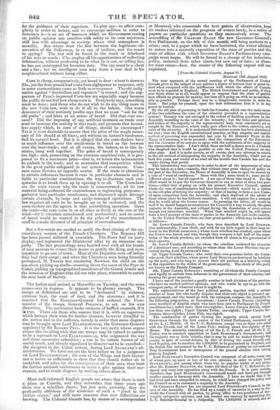Corn is cheap, comparatively, yet bread is dear : wheat
is down to 55s., yet the four-pound loaf costs from eightpence to tenpence, only in some extraordinary cases so little as sevenpence. The old indig- nation against "forestallers and regmters " is roused ; and the sup- porters of PEEL'S improved Corn-law are especially angry because the public do not feel how cheap corn is. Everybody says, something must be done; and those who do not wish to do any thing more to the new Corn-law, wish to do it all to the bakers. One warm denouncer of their untimely profits says that we must "ask for the old paths" ; and hints at an assize of bread. Did that ever suc- ceed? Did the imposing of any artificial restraint on trade ever tend to increase the activity in that trade, and promote that bound- less supply which, in corn of all things, should be encouraged? Yet it is most desirable to secure that the price of the staple neces- sary of life should at all times, and without an instant's hindrance, find its natural level. But it is alleged that the corn-dealers have as much influence over the retail-trade in bread as the brewers over the beer-trade ; and at all events, the bakers, as in this in- stance, hang well together. The price of bread is consequently too high; and, proceeding on the common empirical rule, it is pro- posed to fix a maximum price—that is, to lessen the inducements to embark in the trade, and to neutralize that competition which is the great public safeguard in our system of commerce. Com- mon sense dictates an opposite course. If the trade is obnoxious to certain influences because it runs in particular channels and is liable to particular combinations, the way to frustrate such con- spiracies is to break them up by opening it to all The Corn-laws are the main reason why the trade is concentrated; all its raw material being collected for customhouse or registering purposes— gathered into particular warehouses, and dispensed again through certain channels, by large and easily-managed operations. The law requires all corn to be brought up to be reckoned, and the corn-dealers are the agents in that centralizing operation. Open the trade—let corn come in on all sides as freely as the sun or the wind—let it circulate unreckoned and unobserved ; and no assize of bread would be wanted to fix the price of the manufactured stuff in a trade divested of all principle of centralization.


























 Previous page
Previous page